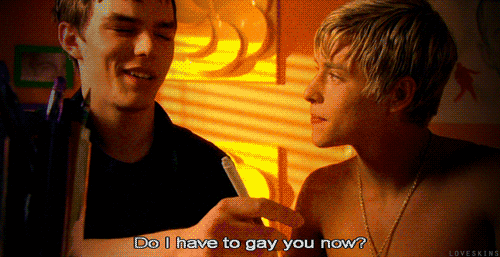This week's Unrequired Reading is inspired by the recent "Super Sirena" fiasco, the popularity of GMA-7's homoserye "My Husband's Lover", and the absolutely ridiculous Russian policy against the LGBT lifestyle. With these recent events, I took a look at our current pop culture and see if there is positive and supportive LGBT sentiments from straight but not narrow artists. The two examples that easily come to mind are Gloc-9's "SIRENA" and Parokya ni Edgar's "THIS GUY'S IN LOVE WITH YOU, PARE".
I have chosen these two examples because as pop songs, they are narratives (if you are still with me at this point, you will have to start speaking my language; these are more than songs, these are stories) that are most frequently experienced by the ordinary people--compared to movies and TV shows that would take several minutes, as media, to be consumed.
"Sirena" takes in its centerstage an old joke, oft repeated in moments of machismo--after all, when do men need to be more manly than in the intimate company of other men?-- A homophobic father is repeatedly dunking his son's head in a drumfull of water. This reverse waterboarding technique is presumed to convert the gay son straight. As the father interrogates and forces his son to choose between being a girl and being a boy, the gay son willfully defines himself as something else: "A MERMAID!"
Gloc 9's "Sirena" narrative then follows the life of the gay son as he grows up as a troubled teen. Harassed, hated. This does not deter him though from remaining loyal to his abusive father. The song ends at the deathbed of the father, and the gay son, now fully grown, remains loyal to him. Vindictive, perhaps? Or forced by circumstances--after all, a sad reality of the Philippines is the steadfast refusal of the state to recognize same-sex unions.
The music video showcases the likes of prominent LGBT personalities like Danton Remoto, and Boy Abunda, lending some Gay Cred to the project. As Katrina Stuart Santiago praised it, "Sirena is everything I didn't expect."
But there really is nothing new in Gloc 9's narrative, Katrina. On first glance, it may be a narrative proposing an empathic look at members of the LGBT community. True, it dramatized (melodramatized, even) an old joke creating a desensitizing new way of looking at the situation as something more real, more current, but it's an old, tired image: an effeminate son being physically abused to go straight. It offers nothing new.
It's limiting. It defines the LGBT reality as effeminate and that only physical abuse is considered abuse. Whereas it could have broken new grounds by exploring the mental abuse, it shied away (or ignorant of it, ignored) from anything other than the trite and tried Roderick Paulate formula: the gay is depicted as "kumekembot" and his earring dangle ("mga hikaw na gumegewang"), his eyelashes are curled.

Worse, the song defines the gay person's worth by his usefulness to the abusive parent. This sends a strong message to young gay people of the Philippines: "We'll accept you, but you have to take care of us when we grow old." Only when the gay persona is useful can he be tolerated, accepted, welcomed, appreciated.
There is nothing in the song that defined the gay persona as an individual. Whereas the project aimed to humanize the gay persona, it failed by its insistence to stick to the Roderick Paulate image: the opportunity to create a character compromised by the easy route of using a caricature. Like Lolita in Vladimir Nabokov's novel, the gay persona ("Sirena") in the song existed ONLY IN CONTEXT to the abusive father: first, as victim, then ultimately, as the caretaker.
Now, I'd like to turn your attention to a much older song. Parokya ni Edgar's "This Guy's In Love with You, Pare" is a pop rock ditty that tells of a (presumably) heterosexual man's confusion with his best friend's sudden change of heart.
But what's amazing about this song is that it offers a whole new perspective into the LGBT reality. What happens when a gay guy falls for his straight best friend?
The positive vibe of the song makes the narrative catchy, but more importantly, it does not draw importance to its message self-consciously. "Oh, no, my best friend's gay // Is he the same old friend I had yesterday?" the narrator laments, perfectly capturing a sentiment that people have about people coming out of the closet: Will you be different now? Are you still our son? Is our little princess going to shave her head now?
Then, in a brilliant flash of insight, the song explores a common tendency of gay people in fetishizing their straight men friendships: "Oh, di kailangan na mag-on!" // "Converted pa rin, nakikipag-fling sayo."
Sure, the bros did not end up romantically together, but even till the end of the song, even after what the two personas went through, the narrator still insists: "Oh, no, my best friend's gay..." Explicitly refusing to redefine their friendships just because the gay persona fell in love with him.
Whereas Gloc-9's "Sirena" wants to call your attention with how "I feel for gays" the songwriter is ("Acceptance! Tolerance! BUT only if you'll take care of dad), Parokya ni Edgar's "This Guy's In Love With You, Pare" takes on a more creative approach: We're still best friends, it's really not an issue, bro.

